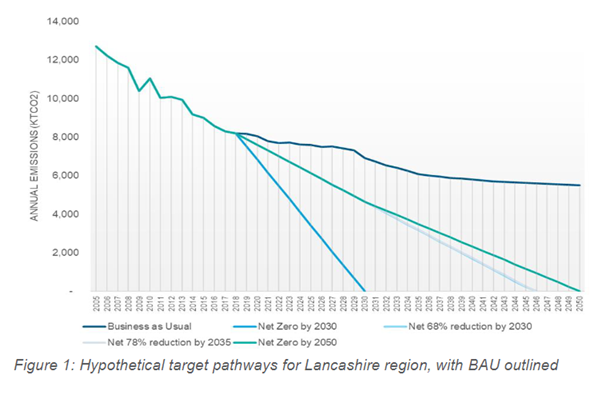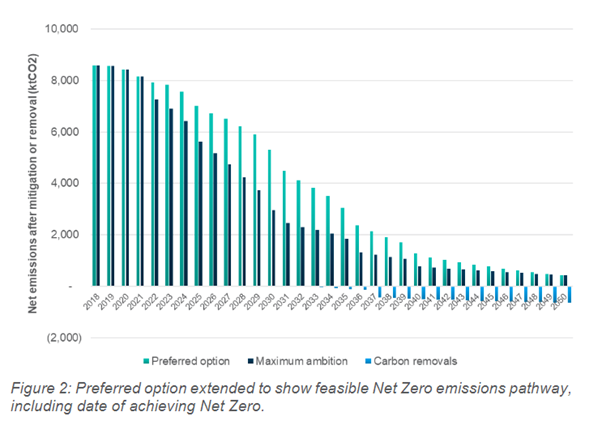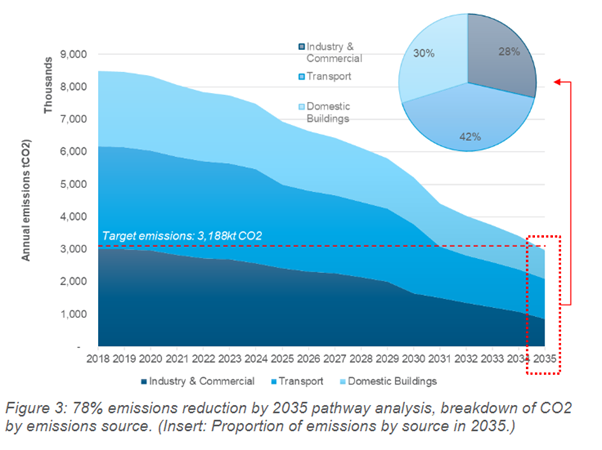CASE STUDY: Atkins

Case Study: Net Zero Pathway Advisory
Client: Lancashire County Council, Blackpool Council, Blackburn with Darwen Council, Lancashire Economic Partnership
Context
Atkins worked with Lancashire County Council and associate unitary authorities and the LEP, seeking to reduce emissions to show when and how ‘Net Zero’ carbon emissions could be achieved across the county. The study sought to create ‘pathway options’ to define what target reductions were feasible by 2030 and 2035.
Atkins solutions and added value
This commission provided an evidence-based assessment of Lancashire’s carbon footprint at a territorial level and generated robust and realistic interventions that put the region on track to achieve emission reductions for three possible pathways options, including analysis of achieving Net Zero carbon by 2030. The commission produced the following:
– Baseline carbon emissions and carbon projections for a ‘Business as Usual’ scenario, compared to carbon budgets.
– Assessment of existing measures and future intervention options for Net Zero action across key sectors [Buildings (domestic, industrial & commercial), Industrial processes, Transport]
– Land use and land use change (LULUCF)
– Cross-sector pathways analysis to reach Net Zero, considering natural and engineered carbon removal options
Atkins facilitated a Climate Emergency Officers Group workshop to discuss the intervention options and proposed route maps. The project is due to present the results of the Options Report at the Lancashire Environment and Climate Summit for Lancashire Leaders and other stakeholders planned for January 2022.
Services provided
Once baseline emissions had been established, the study identified sets of measures that could be adopted, including their emissions saving potential. It then explored three possible pathways options, when considering options for Lancashire region to meet its reduction targets:
1) Net Zero emissions (100% reduction) by 2030;
2) 68% reduction by 2030 (compared with 1990); and
3) 78% reduction by 2035 (compared with 1990).

The pathway analysis outlined a preferred option in each case, based on interventions across multiple sectors to reduce emissions from the baseline. ‘Sensitivity testing’ to inform where the balance of intervention across sectors should fall was also considered. The analysis then included consideration of carbon removals interventions available to reach Net Zero and explored possible pathways to Net Zero.

Key benefits and success factors
The study achieved a clear and robust conclusion for when Net Zero emissions could be achieved across the county, supported by in-depth evidence from across multiple emissions sources. This was supported by credible pathways to help the client articulate key carbon reduction targets. The study also identified the total ‘costs to society’, to equip the client with asks to national government and other bodies, and the relationship with industry it needs to adopt for each sector to reach the required savings.

Organisations Involved
Atkins
Lancashire County Council
Blackburn with Darwen Council
Blackpool Council
